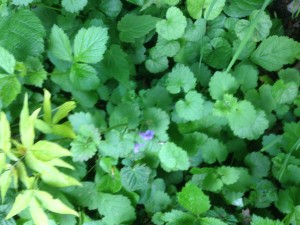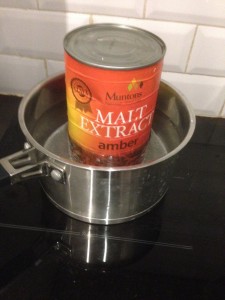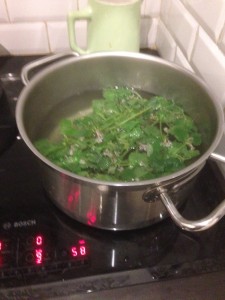D’apres Sacred and Herbal Healing Beer, on peut ajouter 85 g de lierre terrestre (Glechoma hederacea) pour amériser 15 litres de bieres.
Pour 5 litres, je vais utiliser 30g de lierre, avec 750g d’extrait liquide.
Décoction pendant 1 heure dans 3 litres d’eau
Notes de http://blog.metmuseum.org/cloistersgardens/2011/07/08/welcome-to-the-beer-garden/ Archive PDF:
The leaves of ground ivy (Glechoma hederacea) found their way into medieval beer as a flavoring ingredient. Like alecost, ground ivy also served to clarify and preserve beer. It was thought that the addition of the herb to beer would help to clear a person’s head of “rheumaticke humours flowing from the braine” (John Gerard, The Herball, or Generall Historie of Plants, 1597), and it was generally understood to act as a purifying tonic. [For those interested in experimenting with ground ivy as a brewing herb, it is readily found throughout the United States (see the U.S.D.A. Plants database).]
Dans « Sacred And Herbal Healing Beers The Secrets Of Ancient Fermentation », on lit :
Historically, ground ivy was one of the primary herbs used in ale and beer in Europe. Its frequent use in beer can be seen in its common names gill-go-over-the-ground, timhoof, alehoof, and alehove (« gill » is said to come from the French guille, meaning to ferment, and the Old English word was another word for wort). The three great herbalists of England— Gerarde (1597), Culpepper (1651), and Grieve (1931)— all comment on its use in ale. Culpepper insists that « It is good to tun up
with new drink, for it will clarify it in a night that it will be fitter to drink the next morning,- or if any drink be thick with removing or any other accident, it will do the like in a few hours. »‘ . Maude Grieve is somewhat
more comprehensive when she comments in A Modem Herbal that It was one of the principle plants used by the early Saxons to clarify their beers, before hops had been introduced, the leaves being steeped in the hot liquor.
Hence the names it has also borne: Alehoof and Tunhoof. It not only improved the flavour and keeping qualities of the beer, but rendered it clearer. Until the reign of Henry the VIII it was in general use for this purpose.
OG 1,045 à deux semaines 1,025 FG à trois semaines 1,025





Laisser un commentaire